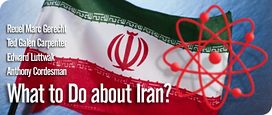Ted Carpenter writes
to deliberately destabilize the Iranian state by encouraging Baluch, Kurdish, Azeri and other secessionist movements strikes me as even more reckless. Yes, we hate the current government in Tehran (for very good reasons), but we must be careful not to create another cauldron of chaos in the Persian Gulf region .
What is destabilizing the Iranian state is not anything that the United States is doing or could do, but its own nature as a multi-national state whose rulers reject pluralism. Everywhere multi-national states have been breaking up in one way or another. The Soviet Union was born truly multi-national under the rule of a muti-ethnic Politburo that repressed rather than expressed Russian chauvinism, and in its old age had become lax with local potentates. But its national republics nevertheless split off to form independent nation-states, some of which remain Russian lieges but are even so independent. Yugloslavia’s break-up continues still after five national republics emerged with one more republic soon to come. Slovakia would not remain in Czechoslovakia; in Catalonia a referendum recently affirmed a separate national identity; and in different ways, separatism is the wave of the present outside Europe too, from Bolivia to Indonesia.
Only policies rigorously pluralist can contain the phenomenon. But Iran’s regime rejects religious pluralism to impose a specific hyper-clerical version of Twelver Shiism in all spheres of life, thus afflicting Bahais and Christians, and antagonizing the 9-10 % of the population who are Muslims but do not belong to the ruling sect. Paradoxically, a regime that presents itself as religious first and foremost also perpetuates the exquisitely secular phenomenon of Persian cultural imperialism, which cannot irritate overmuch the sub-Persian Gilakis and Mazandaranis, but which is totally unacceptable to the Baluch, Kurds and Arabs, and an increasing proportion of the Azeris who make up at least one quarter of Iran’s population. The choice for the United States is not whether to destabilize Iran or not: it is being fragmented by the extremist regime, whether we like it or not. The United States only has a lesser choice to make: do we follow the normal practice of American foreign policy in generally supporting political self-expression, whenever possible and not inconvenient—or do we exempt the Iranian regime. And why on earth do that ?

